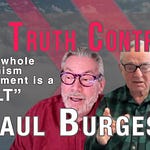Andrew Wakefield is a British physician, researcher, and filmmaker whose work has sparked global debate around medical freedom, vaccine safety, and public health ethics.
Graduating from St Mary’s Hospital Medical School in 1981, he became a Fellow of the Royal College of Surgeons in 1985 and the Royal College of Pathologists in 2001. His career in gastroenterology included more than 150 peer-reviewed papers exploring the links between vaccines, bowel disease, and autism. His 1998 study on MMR vaccine risks, published in The Lancet, ignited fierce controversy and brought attention to concerns around pharmaceutical influence and data integrity.
Facing severe backlash, Dr Wakefield endured what has been described as a coordinated campaign to silence dissenting voices. The 2007–2010 GMC (General Medial Council) hearing, the longest in its history, resulted in him being struck off the medical register for ‘serious professional misconduct’ – a decision many argue was politically motivated. The English High Court later overturned similar charges against a co-author, highlighting flaws in the process.
Since relocating to the US, Dr Wakefield has continued his work through documentary films like Vaxxed: From Cover-Up to Catastrophe (2016) and Protocol 7, shedding light on systemic issues within vaccine policy, regulatory capture, and the suppression of scientific enquiry. His career reflects an unwavering commitment to questioning the status quo, amplifying under-represented perspectives, and advocating for open scientific debate in service of informed choice.
Questions
Some of the questions and issues we explore include:
The cost of questioning when it comes to vaccine safety.
How ‘the system’ handles dissenting scientific voices.
The reliance of the UK medical system on pharmaceutical industry funding – and how it influences research and policy.
How UK public health policy, particularly around vaccination, prioritises conformity over patient safety or individual choice.
Why the system resists critical examination of vaccine safety data.
The impact of the suppression of scientific dissent on public health outcomes.
How to rebuild trust between doctors and families, the National Health Service and patients.
Discussion Log
00:00 – 00:09
Dr Wakefield discusses the suppression of scientific dissent, referencing the U.S. Federal Register (1984) and the prioritisation of policy over scientific debate. He highlights examples of unelected influence in global health decision-making.
00:09 – 00:19
The conversation focuses on pharmaceutical influence over UK medical research, citing the relationship between GlaxoSmithKline and the Royal Free Hospital. Dr Wakefield addresses the MHRA’s (Medicines and Healthcare Products Regulatory Agency) funding model and its impact on regulatory independence.
00:19 – 00:30
Dr Wakefield outlines financial waste and bias in the medical system, referencing the GMC (General Medical Council) hearings (2008–2012) and the Nottingham study (Colville & Pugh, 1993) on MMR vaccine safety.
00:30 – 00:41
The discussion examines the historical decline of infectious diseases due to sanitation (McKeown, 1976), the evolution of vaccine-resistant strains, and Dr Wakefield’s perspective on policy motives.
00:41 – 00:50
Dr Wakefield highlights the importance of listening to parental reports of post-vaccine health outcomes, including autism regression. He references New Jersey autism data from the 2010s.
00:50 – 01:00
The conversation covers vaccine safety studies, including the five-day trial for the hepatitis B vaccine, CDC data concealment of autism links (as referenced in Vaxxed, 2016), and the need for long-term studies.
01:00 – 01:10
Dr Wakefield outlines the case for grassroots reform, the proposed UK vaccine safety referendum, and concerns over mRNA technology and potential risks.
01:10 – 01:16
Final segment focuses on halting mRNA and gain-of-function research, the call for independent safety trials, and the need for unconflicted oversight.
Notes and References
Colville, A. and Pugh, S. (1993) ‘Mumps, meningitis and MMR vaccination’, Lancet, 341(8845), pp. 979–980. Available at: Link (Accessed: 6 June 2025).
Fauci, A. S. (2012) ‘Research on highly pathogenic H5N1 influenza virus: The way forward’, mBio, 3(5), e00305-12. Available at: Link (Accessed: 6 June 2025).
Federal Register (1984) Federal Register of the United States, 49(107), p. 23007. Available at: Link (Accessed: 6 June 2025).
Johnson, P. (2023) Follow the money. London: Abacus.
McKeown, T. (1976) The modern rise of population. London: Edward Arnold.
Wakefield, A. J. (2010) Callous disregard: Autism and vaccines – The truth behind a tragedy. New York: Skyhorse Publishing.
Wakefield, A. J. (2012) Waging war on the autistic child: The Arizona 5 and the legacy of Baron Munchausen. New York: Skyhorse Publishing.
Wilson, G. S. (1967) The hazards of immunization. London: Athlone Press.
The Truth Contract – not just more content, but a commitment.
You’re here because the surface story doesn’t hold.
You’re ready to question, contribute, and help shape a future worth showing up for.
This is the contract: Truth. Action. Together.
Add your voice to the conversation. This is how we grow the mandate for change.
You’re receiving this as a FREE subscriber to The Truth Contract.
Ready to connect with other caring, critical thinkers – and unlock more of the action?
Become a member today – and access the full experience.














Share this post